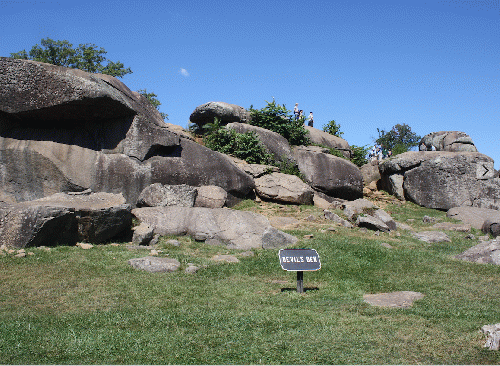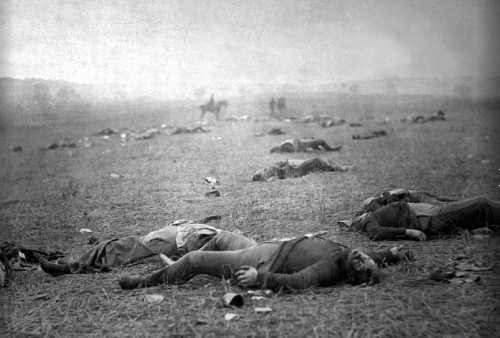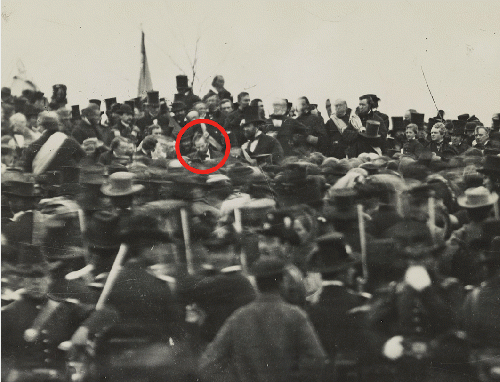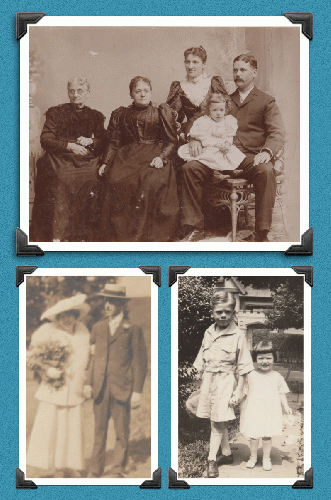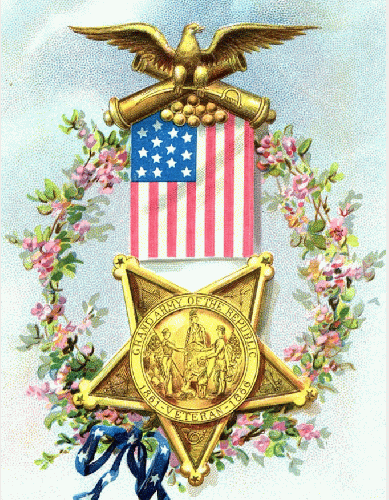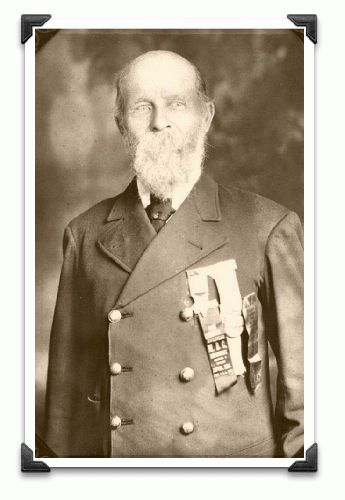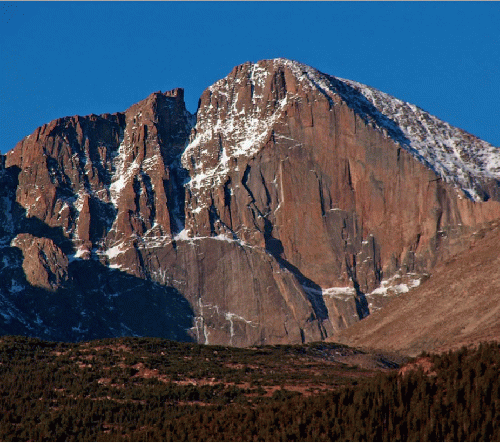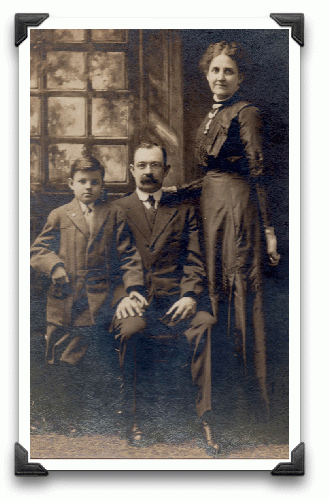
Hezekiah Harris, seated, with son and wife Catherine Griffin Harris
(Image by Meryl Ann Butler) Details DMCA
My great-great-great grandfather, Hezekiah Harris (seated), died a heroic death at Gettysburg on July 2, 1863. When Dad and I visited the site of his demise at Devil's Den a few years ago, the bucolic countryside belied the turmoil of a century and a half earlier.
July 2, 1863 was a day of desperation and bravery for Orange County's 124th New York Volunteer Infantry, which was down to about 200 men from its original 500+. Known as the "Orange Blossoms," they proudly sported orange ribbons on their uniforms. They were men who aspired to a higher cause as they hunkered down on their bellies near Devil's Den, waiting for the oncoming massive lines of Confederate soldiers. When the enemy was just 50 feet away, they stood up to take aim. And their small group did indeed cause havoc among the Confederates, although they paid a high price.
I wonder, was my kinsman one of the men who died then? Or did he live another hour to see his commander, Colonel Augustus van Horne Ellis and Major James Cromwell lead the charge of the 124th directly into the advancing enemy line of men from Texas and Georgia?
The two officers knew that astride their horses they were easy targets, but they were determined to provide inspiration and support for their men by being visible. The Confederates were pushed back 200 yards by the charge, but both officers died along with half the officers and 85 other members of the Orange Blossoms, including Hezekiah.By evening all of the remaining elements of both armies had arrived, setting the stage for the decisive battle the next day. About 165,000 soldiers fought at Gettysburg during those fateful three days. And 51,000 died.
A few months later, President Lincoln arrived at the Gettysburg battlefield and declared that the deaths of so many soldiers would not be in vain, that slavery would end, the future of democracy would be assured, and that "government of the people, by the people, for the people, shall not perish from the earth."
The previous year Lincoln had been in Hampton, Virginia, along with a large Union army at Fortress Monroe. Seeing the size of the army, the Confederates evacuated the nearby Norfolk area on May 9, 1862. Later that day President Lincoln steamed over to Norfolk's Ocean View, where he walked the beach that I can see out my window, undoubtedly deep in thought, and perhaps entertaining premonitions.
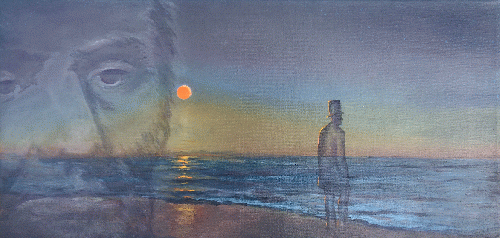
'The Sun Starts to Set on Inequality: Lincoln at Ocean View; May 9, 1862. Oil. 10' x 20' by Meryl Ann Butler
(Image by Meryl Ann Butler) Details DMCA
The people of Orange County raised the money for the monument to the 124th New York Volunteer Infantry on the Gettysburg battlefield; it was the first New York regiment to have a memorial there. It featured a life-sized granite statue of Col. Ellis. I found Hezekiah Harris' name on the side of the monument.
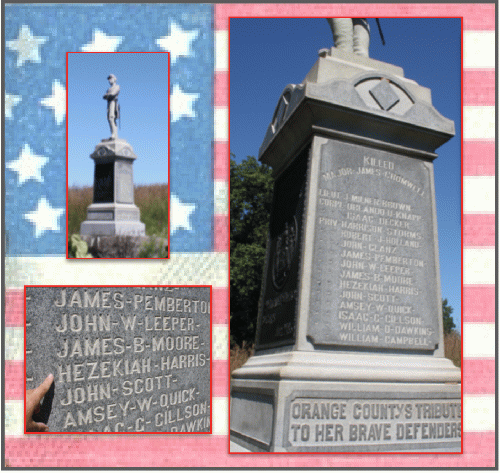
Memorial to the 124th New York Regiment at Gettysburg battleground.
(Image by Meryl Ann Butler) Details DMCA
Hezekiah's grandson, Franklin, married my grandmother, a dyed-in-the-wool Southern belle, born in Atlanta, Georgia in 1894. In spite of living in New York for almost all of the 20th century, she always considered herself to be a Southerner.
[Top photo: The baby is Franklin, my grandfather, the only child of Libbie P. Redfern and Ira Hezekiah Harris (married June 11, 1885 in Manhattan.) The older woman at far left is presumably Ira Hezekiah's mother, Catharine Griffin, widow of Hezekiah Harris. Second from left is Libbie's mother, Mary Wood Holder. Bottom left photo: Franklin Harris and Mohena Belle Roberts' wedding day, June 23, 1916. Bottom right photo: Franklin and Mohena Belle's children, my uncle Ira (b. 1919), and my mother, Mohena Belle (b. 1923), called "Dolly."]
If Hezekiah had lived, he probably would have joined the Grand Army of the Republic (G.A.R.), a fraternal organization composed of veterans of the Union armed forces that served in the Civil War.
The G.A.R. was one of the first organized advocacy groups in American politics. They supported voting rights for black veterans, helped to make Memorial Day a national holiday, lobbied the United States Congress to establish regular veterans' pensions, and supported Republican political candidates. (That would be Lincoln's Republican party, not the party that claims that label today.)
My great-great-grandfather on Dad's side, the Rev. Col. William "Billy" Butler, a Civil War veteran, was Chaplain of the G.A.R. in Longmont, Colorado. Young Billy left Colorado in 1861, telling his father that he had to go help "settle the Civil War" and joined the 4th Wisconsin Cavalry. His unit moved to Fortress Monroe, Virginia, in early 1862, and oddly enough he sailed from there on the steamship Constitution just a few weeks before Lincoln arrived and walked along my beach.
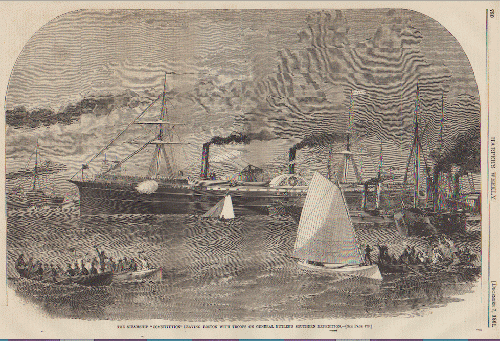
The Steamship 'Constitution' from Harper's Weekly, Dec. 7, 1861.
(Image by Public Domain) Details DMCA
After the Civil War ended, Billy returned to Longmont, Colorado, opened a florist shop, and still holds the record for the oldest person to ascend Long's Peak, the northernmost fourteener in the Rocky Mountains (14,259 feet high.) Billy saw action in 53 Civil War battles during four years of service, but unlike Hezekiah, Billy's survival meant he could climb Long's Peak on September 2, 1926, in celebration of his 85th birthday.



